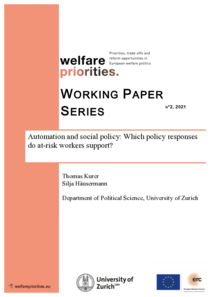Automation and social policy: Which policy responses do at-risk workers support?

Kurer, Thomas ; Häusermann, Silja
University of Zurich. Department of Political Science
University of Zurich - Zurich
2021
21 p.
social policy ; automation ; welfare state
Worging Paper Series
2
Social policy
English
Bibliogr.
"How does automation a!ect the politics of the welfare state? People whose jobs are at risk of being automated may react by claiming social protection (passive social policy), upskilling/commodi"cation (active social policy) or both. In this brief contribution, we study this question relying on novel survey data on perceived automation risk and social policy preferences in 8 West European countries. We "rst estimate the size and pro"le of the group of voters concerned about their potential substitution by technology and examine how subjective perceptions of automation risk compare to widely used objective indicators of automation risk. In contrast to a somewhat alarmist public debate, we "nd that a surprisingly small share of voters feels imminently threatened by automation. We then turn to an assessment of the demand for di!erent kinds of social policy as a response to automation risk and "nd highly consistent preferences across countries. At-risk workers support and prioritize passive unemployment protection measures, while support for activation, education and labor market reintegration policies is very limited. In other words: progressive automation increases demand for passive, consumption-oriented welfare policies and thereby narrows the support base for an activation/human capital-oriented policy strategy, which technocrats and policy advisers tend to recommend in reaction to automation of production."
Digital
The ETUI is co-funded by the European Union. Views and opinions expressed are however those of the author(s) only and do not necessarily reflect those of the European Union or the ETUI.